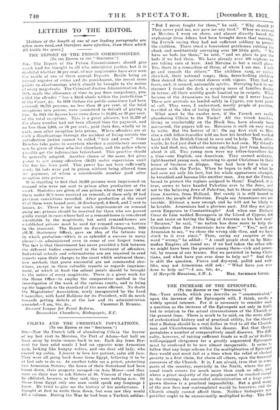CILICIA AND THE CHRISTIAN POPULATIONS. [To THE EDITOR OF THE
" SPECTATOR."] SIR.—Now the French talk of abandoning Cilicia the horror of my last visit to Mersina, the Port of Adana—but half an hour away by train--comes back to me. Each day from Bey- rout for four solid meals I had sat opposite nine Armenian men, looking like hungry wolves, and one dear old lady, who shared my cabin. Llearnt to love her patient, calm old face. They were all going back home from Egypt, believing it to be at last safe to do so. At another table sat a priest, protecting two Armenian Sisters; the house of their Sisterhood had been burnt down, their property ravaged—in Asia Minor—and they were on their way to ask Sisters of St. Vincent if they might be affiliated, because, as they said, they were nothing now. Of those from Egypt only one man could speak any language 1 knew. He tried to give me the history of his misfortunes. I thought at first to write them down, but soon saw they would fill a volume. Duriug the War he had been a Turkish soldier.
"But I never fought for them," he said. " Why should I? They never paid me, nor gave me any food." When we arrived
at Mersina I went on shore, and almost directly beard the orphanage from Adana had been brought down that morning, the French saying they had not sufficient soldiery to protect the children. There stood a benevolent gentleman rubbing his cheek and meditatively surveying over 100 little girls. s have no beds for them," he said, " and no place to put the beds if we had them. We have already over 400 orphans we are taking care of here. And Mersina is but a small place. Yes, there is a committee of three, of whom I am one. I will go and consult the others." The children sang, or rather shrieked, their national songs; thin, fierce-looking children then danced their national dances with vigour. They had no fears, and, it seemed, untamable spirits. Hurrying back to ray steamer I found the deck a surging mass of fathilies fleeing in terror, all their worldly goods knotted up in carpets. What became of the Armenians we had brought up I never heard. These new arrivals we landed safely in Cyprus, our next point of call. They were, I understood, mostly people of position, terrified at the idea of losing their wealth.
What must be the exodus now, if the French are really abandoning Cilicia to the Turks? All the Greek families, living so comfortably on the Black Sea, have already been massacred, the papers tell us. Massacre is such an easy word to write. But the horror of it! On my first visit to Mer- sina a rich fellow-traveller told me how his brother had worked hard with the British Consul to save and to help. Then, after- wards, he had just died of the horrors he had seen. My friend's wife had died, too, without seeing anything, just from hearing about it all. Two young men were my fellow-travellers for a time—one English, one American. They seemed ordinary, light-hearted young men, returning to spend Christmas in their house of business at Aleppo. One had been for a time a prisoner with the Turks. When he began to talk of what he had seen not only his face, but his whole appearance changed, he trembled and became like another man. Are not the French bound to protect the regions assigned to them? England, it is true, seems to have handed Palestine over to the Jews, and not to the believing Jews of Palestine, but to those unbelieving from America, from Holland. But surely it is still bound to protect the people of Palestine. People say Armenians are not lovable. Ill-treat a man enough and he will not be likely to be lovable. Armenians had a glorious past. Did they not give seven Emperors to Constantinople? And when one Richard Coeur de Lion wedded Berengaria in the Island of Cyprus, did lie not insist on having the King of Armenia as his best man? " Because," he said, " no nation has done more to help the Crusaders than the Armenians have done." " Yes," said an Armenian to me, " we chose the wrong side then, and we have stuck to it ever since." Then, seeing my surprise at the word " wrong," he added : " A small people shut in by Males medan Empires all round us; if we had taken the other side we might have been the greatest among them—rich and power- ful, by reason of our brains. But we persisted in being Chris- tians, and what have you ever done to help us?" And that is still the question. Fierce and dry-eyed, pallid and wolf- like, may not Armenians still ask : " What have you ever done to help us? "—I am, Sir, &c., 52 Morpcth Mansions, S.W.1. MRS. ARCHIBALD LITTLE.










































 Previous page
Previous page